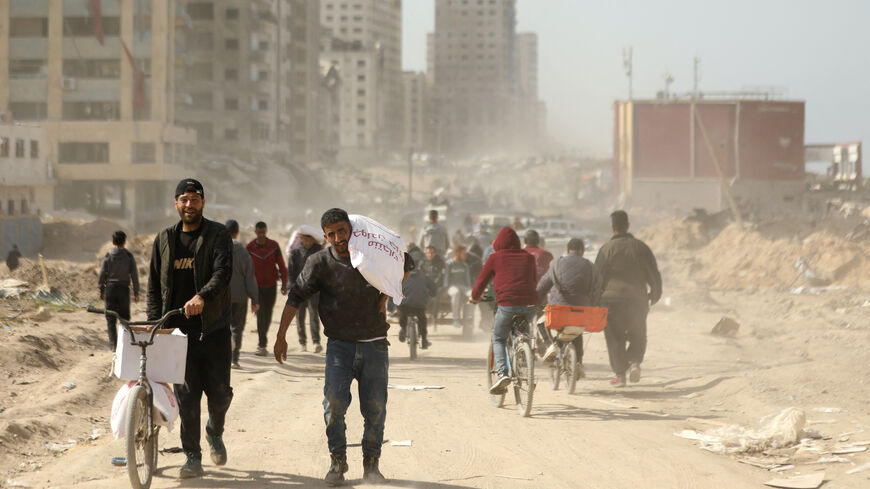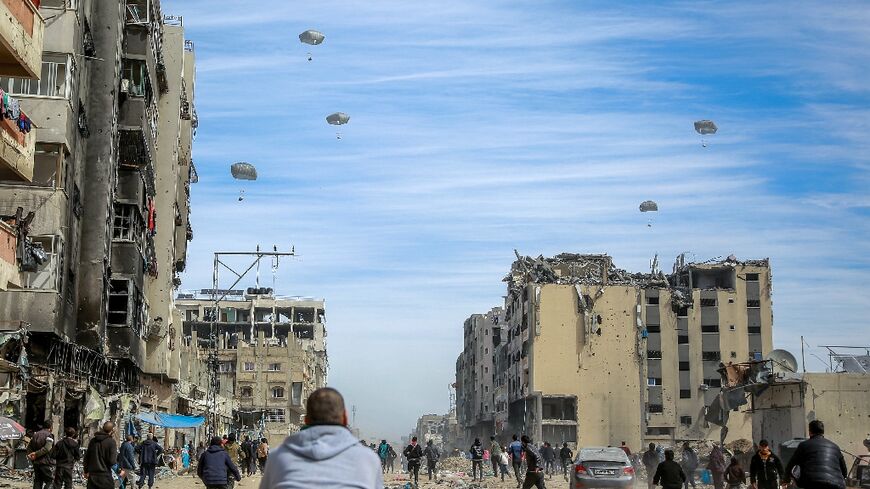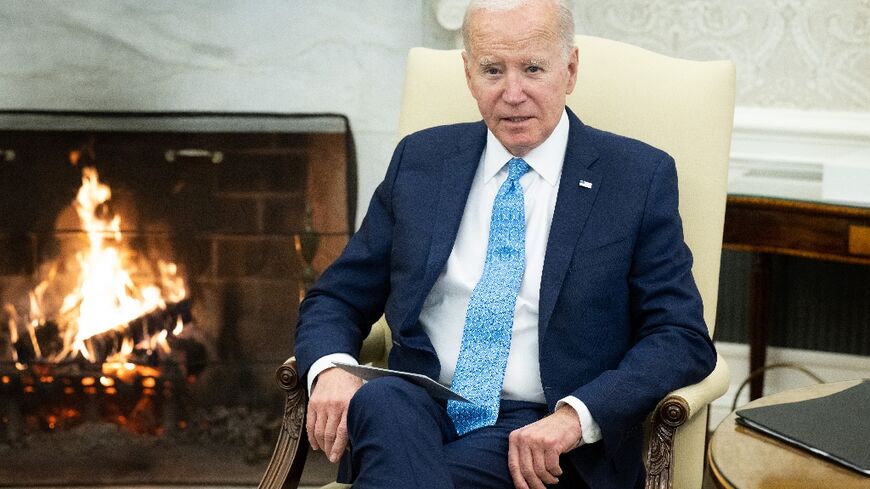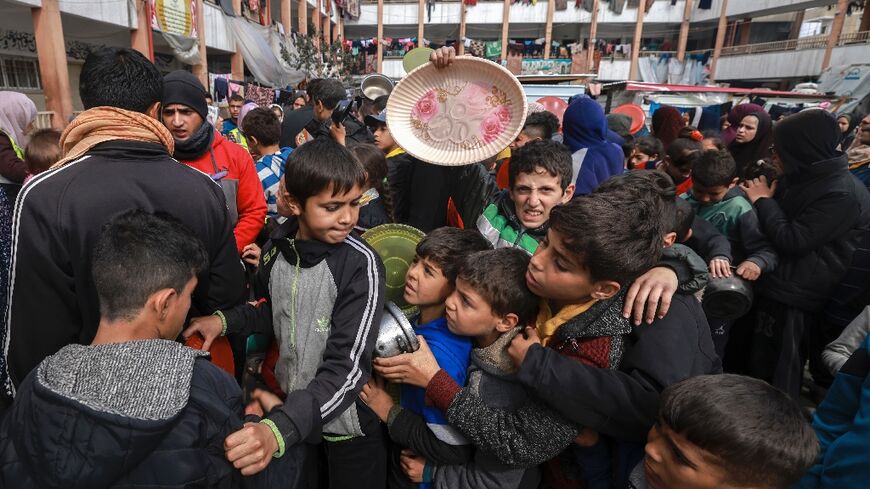Biden announces US airdrops of humanitarian aid to Gaza
The announcement comes as Biden faces withering criticism over the Israeli military's brutal campaign in Gaza, which has left a quarter of the population on the brink of famine, according to the United Nations.

WASHINGTON — President Joe Biden announced on Friday that the United States would airdrop humanitarian aid into Gaza as his administration faces overwhelming pressure over its support for Israel's war.
Sitting alongside Italian Prime Minister Giorgia Meloni in the Oval Office, Biden said the United States would work with Jordan and others to deliver supplies “in the coming days.”
"Innocent people got caught in a terrible war, unable to feed their families, and you saw the response when they tried to get aid,” Biden said. "Aid flowing to Gaza is nowhere nearly enough now — it's nowhere nearly enough. Innocent lives are on the line and children's lives are on the line."
Jordan has conducted more than a dozen airdrop operations since the start of the war in Gaza, where the Health Ministry says more than 30,000 Palestinians, most of them women and children, have been killed in Israel’s military campaign since October.
On Tuesday, planes from the United Arab Emirates, Egypt and France joined Jordanian air force pilots in dropping crates of food and other supplies along the Gaza coast.
The US military plans to conduct the airdrop from bases in the region. The mission is not expected to address in any significant way the needs of Gaza's population of 2.3 million people, of which roughly a quarter are on the brink of famine, UN officials said this week.
The administration is still working through how collection and distribution of the airdropped aid would work with humanitarian groups already on the ground, White House National Security Council coordinator John Kirby said following Biden’s comments on Friday.
“You will see additional airdrops,” Kirby told reporters. “We’ll try to do this in a sustainable way over time. It will be a supplement to, not a replacement for, moving things in by ground.”
The US is also working to potentially set up a maritime corridor to deliver “hopefully large amounts” of aid by sea, Kirby said.
Only a trickle of humanitarian assistance has reached the Gaza Strip despite months of pleas from the United States, the United Nations and humanitarian groups for Israel to open more land crossings into Gaza and improve the convoluted inspections process for aid deliveries. On average, fewer than 150 truckloads arrived daily in the month of February, far below the prewar average of 500 trucks per day, according to UN figures. Biden said Friday the United States would “insist” that Israel facilitate the entry of more trucks through additional routes.
Scott Paul, who leads humanitarian policy at Oxfam America, said the planned airdrops would deliver only a symbolic amount of aid while being deeply degrading to the population.
Airdrops “would mostly serve to relieve the guilty consciences of senior US officials whose policies are contributing to the ongoing atrocities and risk of famine in Gaza,” Paul said in a statement.
Airdrops are an expensive and inefficient means of aid delivery compared to road convoys and carry the risk of aid diversion. Humanitarian organizations consider them a tool of last resort to reach a population that is not accessible by land.
“The question has to be, why is an airdrop necessary here?” said Jeremy Konyndyk, president of Refugees International.
Konyndyk recalled when the United States airdropped food and water to members of Iraq’s Yazidi minority trapped at Mount Sinjar, a mountainous region of northern Iraq that the Islamic State had surrounded in 2014.
“Why was an airdrop necessary? ISIS,” Konyndyk said. “In a territory that is held by a nominally allied or friendly military, if the only way to get the aid in is an airdrop, then that's a political issue, not a security issue.”
The US announcement comes a day after Palestinian health officials said more than 100 people died and hundreds more were injured when the Israeli military opened fire on crowds gathered around a convoy of aid trucks in Gaza City. Israel acknowledged that its troops opened fire but attributed most of the deaths to a stampede or said they were run over by trucks.
US officials said the deadly incident underscored the urgency of a temporary cease-fire between Israel and Hamas, whose fighters killed some 1,200 people and took another 250 hostage on Oct. 7.
Negotiators from the United States, Qatar and Egypt are aiming for a deal before Ramadan begins around March 10. Without a halt to the fighting during the Muslim holy month, Israel says it will move forward with its planned offensive in Gaza’s crowded border city of Rafah.
The White House says Israel needs a credible plan to protect civilians in Rafah before launching its offensive there. Aid groups have warned of humanitarian catastrophe, saying it would be impossible to safely evacuate the estimated 1.4 million people who are sheltering in the city.
Friday’s announcement of planned US airdrops came after USAID Administrator Samantha Power met with Israel’s prime minister, Benjamin Netanyahu, and Defense Minister Yoav Gallant on Wednesday. The top US aid official announced this week that Washington would be providing an additional $53 million in humanitarian assistance to Gaza and the West Bank.
Earlier this week, the chair of the Senate’s Armed Services Committee, Jack Reed (D-RI), and Sen. Angus King (I-Maine) urged the Biden administration to provide a hospital ship for Gaza.
Pentagon officials on Thursday said they were not aware of any plans to do so. That prospect entails significant security risks, as personnel would have to go ashore in an active war zone, a US official briefed on the deliberations told Al-Monitor.
This developing story has been updated since initial publication.







